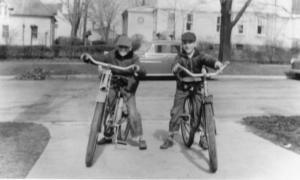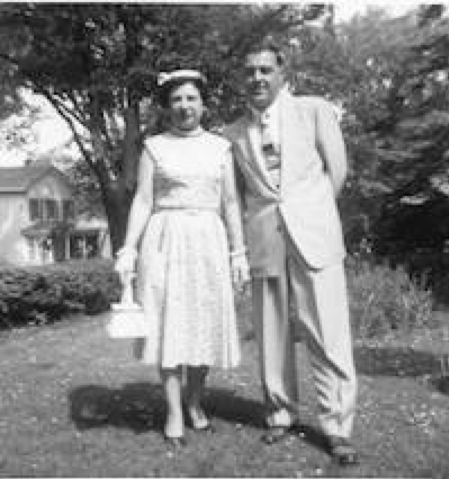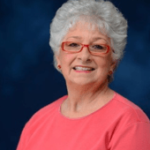Bonnie Brown
Bonnie Brown: Q&A with Professor Emeritus of Leadership and Counselor Education, Philip G. Cooker
*Editor’s Note: The latest installment in the Ole Miss Retirees features is Professor Emeritus of Leadership and Counselor Education, Philip G. Cooker. The organization’s mission is to enable all of the university’s faculty and staff retirees to maintain and promote a close association with the university. It is the goal of the Ole Miss Faculty/Staff Retirees Association to maintain communication by providing opportunities to attend and participate in events and presentations.
Dr. Cooker has quietly and effectively gone about the business of counseling, teaching, writing, and forensic work through the years, and has quite an impressive and long career. He has a great sense of humor and loves to cook. He also has a great Ole Miss story.

Philip Cooker. Photo provided.
Brown: Where did you grow up? Please talk about your childhood, parents, and siblings.
Cooker: I was born and grew up in Oswego, New York – a place probably most noted for long winters and lots of snow. A river runs through it, and it is filled with salmon trying to make it upstream at the end of summer. You could see Lake Ontario from my upstairs bedroom window in a house that was built in the 1860s. I was a first-born, although my brother was only two years younger, resulting in our being close throughout childhood. Looking back, we had wheels (our bikes, no helmets), and along with our neighborhood friends, we had quite a bit of freedom, way more than many kids have today.
My brother’s name is George, after my father. He is an Air Force veteran, now living in Deland, Florida. He sold his seafood business several years ago and now lives a fairly active life with visits to the “Y” and various outdoor activities figuring into his routine. He spends lots of time at car shows and riding his motorcycles, pretty much against the wishes of his children.

Phil with his brother George.
My parents, George and Rose, were first-generation Americans, both of their parents landing at Ellis Island from Calabria, Italy in the early 1900s. That is where the family name “Cucaro” was changed to “Cooker.” This reassignment of surnames, we discovered, was not uncommon and made genealogical research pretty difficult for other families. As we were growing up, I remember that our parents were always working. Our dad worked several different jobs, learning things that would pay off later on. On the other hand, our mother had only one, that of a sewing machine operator in one of the local garment factories. Eventually, she got talked into becoming a local union representative in the International Ladies’ Garment Workers Union. She was also a breast cancer survivor. She was diagnosed in her early 70s but made it to age 97, surviving our dad by four years.

Rose and George Cooker. Summertime in Oswego.
Brown: Where did you go to school?
Cooker: I began school too soon (at age four), attending a kindergarten just a block from home. Despite a somewhat uneven start (I was fairly adept at skipping school without my mother’s knowledge), I completed my K-12 education in Oswego. After high school, I completed a bachelor of science at the local state university, Oswego State (now SUNY Oswego), with a major in chemistry. Eventually, I returned to complete a two-year masters degree in counseling psychology. That degree, and work as an elementary school counselor, led to a doctoral degree from Florida State University.
Brown: What subjects were hardest for you in school?
Cooker: It would have to be languages, although four years of Latin probably paid dividends later on when taking entrance exams such as the SAT and GRE. Ironically, the German requirement for further graduate work in chemistry steered me into psychology and another career path.
Brown: Who influenced your career choice?
Cooker: There were a number of people who certainly were influential. Two individuals, both a part of my undergraduate and graduate education, still stand out. Dr. Donald Snygg was a psychology instructor, and although I had little extra time away from the demands of my major, I signed up for most of his courses. Only much later on did I realize the major impact he had on the entire field of psychology. Like others before him, Dr. Snygg died of a heart attack shoveling snow during another brutal Oswego winter. That was in 1967 while I was finishing my master’s in counseling psychology. Just a few months earlier, Dr. Snygg was bestowed the rare honor of University Professor by the SUNY system. I thought how good was it that he received that recognition when he did.
Another strong influence would have to be Dr. Lucy Wing, chair and founder of the Counseling and Psychological Services Department where I completed my master’s degree. I was fortunate to have Dr. Wing as an instructor/supervisor while I was a student and found her always available for consultation after graduation. As was the case with Dr. Snygg, understanding of the impact of Lucy Wing’s work beyond the little (at the time) campus of 2,000 students came much later. Dr. Wing, along with the likes of Susan B. Anthony and Harriett Tubman, was recognized in a 2013 book, “Remarkable Women in New York State History” (Engel & Smiley, 2013). What struck me about both of these individuals was their willingness to take an interest in me as a person, not just a student. They were good at pushing you to think beyond just the present and consider a bigger picture.
Brown: Tell us how/when your Ole Miss “story” began. What did you know about Ole Miss before you accepted a position here?
Cooker: Like most from outside this area, I only knew what I learned from television and newspapers. Events around James Meredith’s admission and Ole Miss football were national news. I became personally involved with Ole Miss while in my doctoral program at FSU. During that time, I was working with a grant that paired traditionally black colleges and universities in five states with a major university from the same states. Florida State was paired with Florida A & M and Ole Miss with Jackson State, providing me with several opportunities to interact with faculty and students from those universities and a visit to the UM campus. Nearing graduation, I was invited to return to Ole Miss to interview for a position in the Educational Psychology department. During that visit, I met with Chancellor Porter Fortune and Dean Sylvester Moorhead and was offered a contract before I left town. I began work in 1971 and retired from my full-time position and coordinator for the doctoral program in Counselor Education in 2005.
Brown: What one question can you ask someone to find out the most about them?
Cooker: I believe that you can learn the most by listening in ways that go beyond just the words. In many cases, there is more to a message than the literal or surface meaning. However, if I had to pick just one question, I think it would be “Who are you?” It should be asked several times and, as similar to peeling an onion, layers are gradually removed until we begin to arrive at a more complete picture of ourselves. It’s what you decide do with this information that is important.
Brown: What do you consider to be the highlight of your career?
Cooker: It is very hard for me to point to one career highlight. However, I have had the good fortune as a teacher, trainer, and collaborator to be among and involved with so many bright and motivated students. As a psychologist, I feel a great sense of privilege and respect from my work with individuals and families who refused to give in to the enormous challenges they faced. So, taken together, these experiences might account for a pretty big highlight for me.
Brown: What accomplishment are you most proud of?
Cooker: Being promoted to full professor is probably one that many of us in higher education would point to. This is something that I admit was achieved only with the assistance and encouragement from others, as is the case with most significant accomplishments. Working together with faculty, students, graduates, and a supportive administration, I still consider obtaining the American Counseling Association’s (ACA) Council for Accreditation of Counseling and Related Educational Programs (CACREP) accreditation for our three graduate programs to be a significant accomplishment. I say that because the accreditation affected the lives of our graduates in very positive ways.
Brown: If there was something in your past you were able to go back and do differently, what would that be?
Cooker: I never liked this question because it promotes second-guessing that can drive you crazy. You never know how things would have played out with the change. Maybe it would have been better, but it could have been worse. In this vein, regrets should not be confused with learning from mistakes. And, mistakes should be seen as information. My only regret is that I forgot where I stole this idea, but I still really like it. However, there is another side of this coin that likely applies to many of us. Whenever there are words or actions that have adverse effects on others, I would have to admit that such things are certainly worthy of regret and a wish for a do-over. For most of us, not a great feeling but probably well earned. Then, it comes down to two choices. One involves self-persecution or finding someone eager to fill that role (they are out there waiting). The other is finding and navigating a path to redemption. Easier said than done. In case anyone is wondering, something like Kobe buying his wife a $4 million diamond ring does not count as redemption.
Brown: What is the best advice you ever received?
Cooker: Understanding wins out over advice consistently, and it is usually much better received. Something I remember hearing was some variation of the statement, “No matter how bad things look now they almost always get better.” Although mostly true, this one is still hard to take seriously when times are bad. The value of advice might be illustrated in a study of prescription medication. Roughly, the results indicated that of people getting a prescription only one in four would get it filled and take it as prescribed, another would not get it filled at all, another would but have it filled would not take it, another would have it filled but take it incorrectly. Remember, this advice is coming from physicians, one of our more trusted group of advisors.
Brown: What advice would you give to your 20-year-old self?
Cooker: This is one I would give: “No matter how much you will hate them, bet on the Patriots in a Super Bowl, unless they are playing the Giants.” Of course, I would probably ignore it.
Brown: What do you do to improve your mood when you are in a bad mood?
Cooker: Throw things. I have gotten better in that instead of destroying something of value, I might throw something like a cereal box. At some point, coming to the realization that I am not special and should not expect to get my way 100% of the time, actually helps.
Brown: Tell us something about yourself that not many people may know.
Cooker: I was an altar boy. I will leave it at that.
Brown: What “old person” things do you do?
Cooker: Trying to fix things before calling in someone who knows something. Watching too much television–range of political news and financial shows–although I do not get my news from Fox, so I can’t count that. Being obsessed with the weather, here and everywhere else. Doing just about anything related to water. Not sure if any of these things really are “old person things” except they seem to fit the stereotype.

Phil paddleboarding on Tingley Lake in Pennsylvania. Summer 2018.
Brown: What gives you great joy?
Cooker: Making people laugh.
Brown: What do you do to relax?
Cooker: Right now, I am looking forward to baseball. I have DirecTV Extra Innings so we can get virtually any game being played. Growing up, and even today, the team our family followed would be the Yankees. I remember my dad and uncles taking my brother and our cousins to the Stadium every summer. Of course, like most kids on our block, the player that gave us joy was Mickey Mantle. Later, we would find there was more to his story than we knew or could imagine at the time.
With two televisions/DVR, smart phone, and tablets, I will try to watch most every March Madness game. It is called “madness.” When the weather is bad, video games, believe it or not, can be relaxing or at least distracting. Books, audio or print, make the list. I lean toward anything that can give you a scare or strongly connects you with a character. Violence and abnormal behavior is usually a theme but strictly from a clinical perspective, I think.
Brown: What has become your routine since you retired? Do you have hobbies?
Cooker: According to the IRS, I am still working. I don’t think I ever had routines in the strictest sense. I have a gym downstairs; so, daily (almost) exercise could be one. Working outside figures in when the weather is halfway decent. Otherwise, I am not locked into anything enough to call it a “routine,” but I may get an argument about that. I do like to wash my hands before eating, so add that one.
Hobbies. My primary hobby is to do what I want as much as I can. Not always possible, but always sitting in the front of my brain.
Brown: To quote Katherine Meadowcroft, cultural activist and writer, “What one leaves behind is the quality of one’s life, the summation of the choices and actions one makes in this life, our spiritual and moral values.” What is your legacy?
Cooker: Wow! This is a great question and one that is not easy to answer. You really want to get this one right. So, for now, I will just say that I would like to have more stuff in the “plus” column than in the other one. The true test might be how many people say “Glad he’s gone,” and how many say that “We will really miss him.”
 Bonnie Brown is a retired staff member of the University of Mississippi. She most recently served as Mentoring Coordinator for the Ole Miss Women’s Council for Philanthropy.
Bonnie Brown is a retired staff member of the University of Mississippi. She most recently served as Mentoring Coordinator for the Ole Miss Women’s Council for Philanthropy.
For questions or comments, email hottytoddynews@gmail.com.

















You must be logged in to post a comment Login